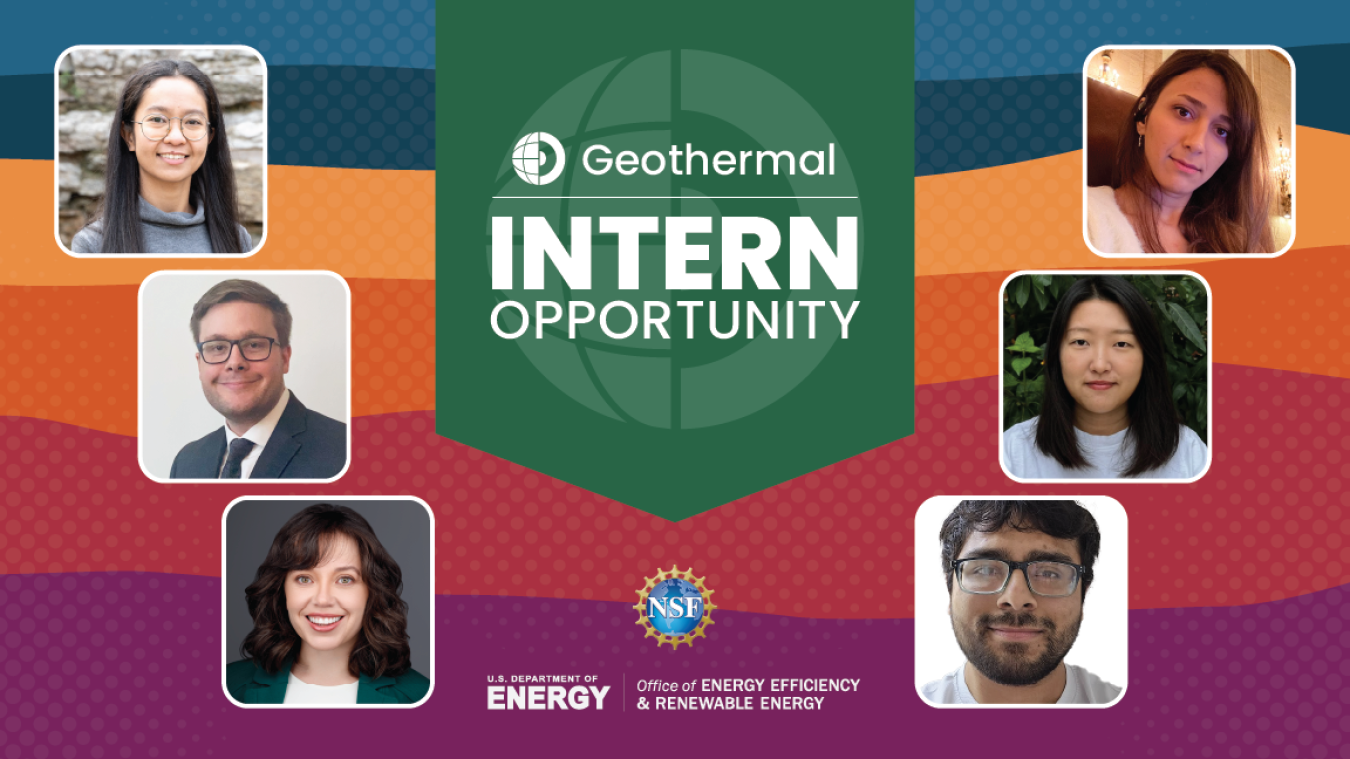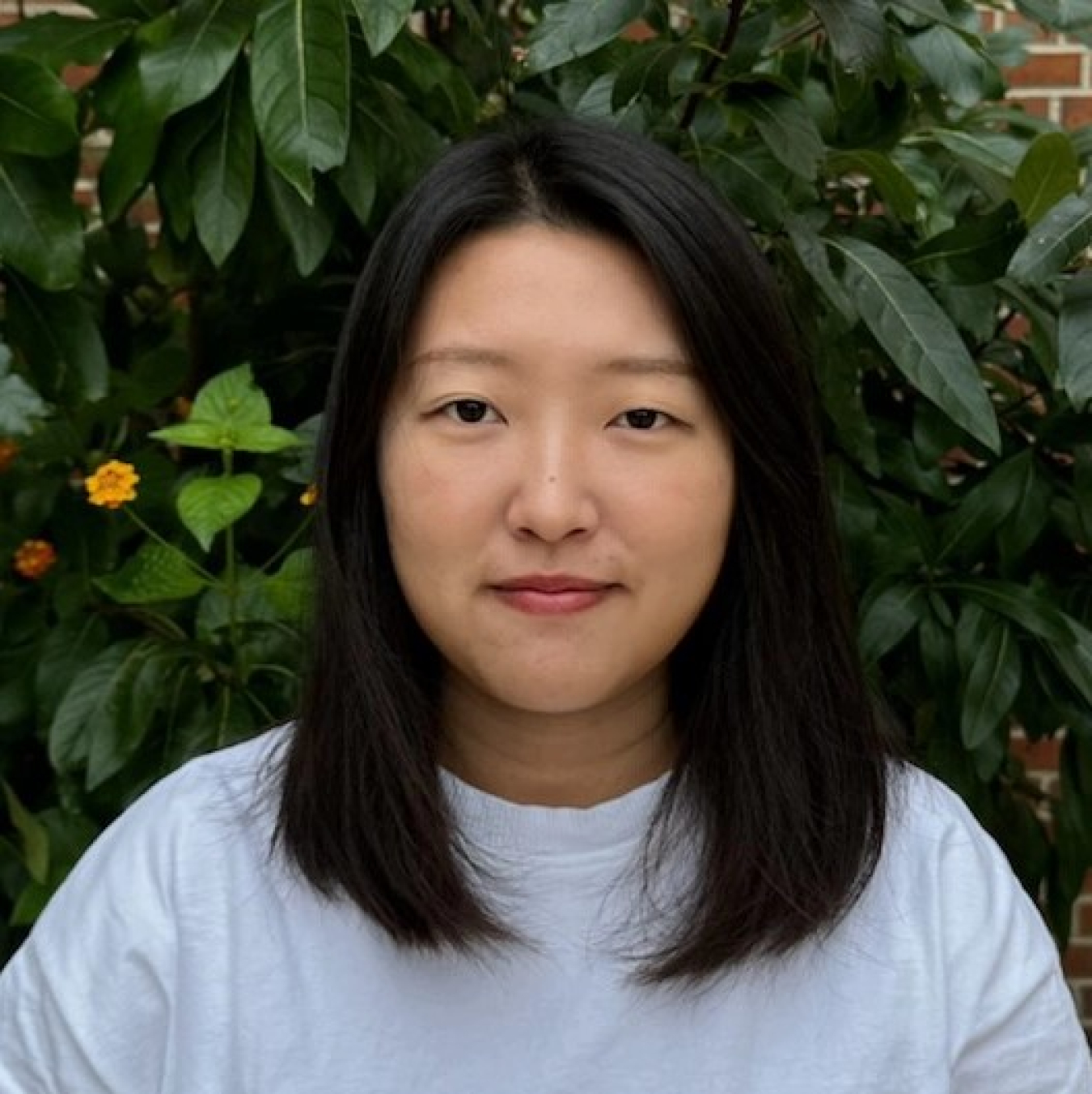Learn how the Geothermal INTERN opportunity supports a community of graduate students and contributes to the next generation of the growing geothermal workforce.
Geothermal Technologies Office
October 15, 2024
Six of the 2024 Geothermal INTERNs. (Left to right) Porraket Dechdacho, Tyler Hickey, Lauren Terry, Hugo Zazueta, Seungmin Lee, and Feaze Ghazvini.
A new cohort of geothermal interns is stepping into this hot career field! The Geothermal INTERN opportunity, a collaboration between the Geothermal Technologies Office (GTO) and the National Science Foundation’s (NSF) INTERN program, supports a community of graduate students forming the next generation of the growing geothermal workforce. Like the multi-faceted nature of geothermal energy, their work covers a kaleidoscope of research areas, with the potential to help expand geothermal around the world.
This year’s cohort of 24 students represent colleges and universities across the United States, including 14 public universities and three private institutions. With support of the INTERN program, this cohort of 24 students are working with a range of host institutions on geothermal projects, including private companies, state geological surveys, and national laboratories.
The geothermal field is expansive, enabling this internship opportunity to serve the career growth of students pursuing a variety of degrees. Some students are specializing in fields conventionally associated with geothermal, such as Hugo Zazueta, who is a master’s student in civil engineering at the University of Texas Rio Grande Valley, and Feaze Ghazvini, a Ph.D. candidate who is studying chemical engineering at the University of Southern California. Others are bringing more unexpected academic specialties to geothermal research. Florida State University’s Seungmin Lee is a doctoral candidate whose research specializes in applied and computational mathematics. Though mathematics may not be the first research field that comes to mind when thinking about geothermal energy, Lee noted that, “having a [varied] academic background can be beneficial when studying geothermal. The numerous opportunities to engage in conversations with people from various fields allows for an inspiring exchange of ideas.”

“Having a [varied] academic background can be beneficial when studying geothermal. The numerous opportunities to engage in conversations with people from various fields allows for an inspiring exchange of ideas.”
Seungmin Lee
Florida State University
Many of the interns are also bringing their unique passions and backgrounds to the program. Porraket Dechdacho has known about geothermal energy for some time but only more recently became interested in the possibilities of applying an understanding of flow and transport in fractured rocks to geothermal research. A Ph.D. candidate researching hydrogeology at the University of Minnesota, Twin Cities, Dechdacho also shared that her love of fine art augments her internship at Los Alamos National Laboratory: “I have a passion for both research and film photography. They may seem unrelated but my interest in photography teaches me to be creative, plan carefully, and pay close attention to details.”
Although graduate research can consume most of a student’s time, Lauren Terry, who is interning at Coso Operating Company’s geothermal facility, has leveraged her love of geological research to global travel, including field work in British Columbia and Japan. Terry was a secondary science teacher for three years prior to becoming a Ph.D. candidate at the Colorado School of Mines. However, her interest in geothermal goes back to a young age: “Geology has always fascinated me. I grew up in Colorado, with spectacular rocks at hand and ghost towns steeped in mining history. Maybe it was inevitable that I would study geology.”
Another intern noted that it took him a while to figure out his passion. Tyler Hickey describes himself as “a non-traditional student” who “at one time was unsure about my career path and academic future until I found geology. This internship is just the start to my journey of obtaining a career in [renewable] energy.” A graduate student at West Virginia University, Hickey hopes to use his internship at West Virginia Geological and Economic Survey to find areas within northcentral West Virginia that are potentially suitable for direct-use geothermal. The Eastern United States is a new frontier for geothermal power exploration; fostering research like Hickey’s can help create pathways for district heating and cooling in commercial and residential buildings that have long relied on traditional fuels.
While simultaneously pursuing graduate research and forging new understanding of geothermal energy, the interns also gain valuable experience being a direct part of the geothermal workforce. Hugo Zazueta is interning at Oak Ridge National Laboratory and said, “I applied for the geothermal internship to contribute to a prestigious project aligned with my goal of advancing [renewable] energy. The constant advice and equipment demonstrations have equipped me with the knowledge to advance my research.”
Feaze Ghazvini noted that one of the reasons she applied for this program was its ability to assist her goal of becoming a female leader in the geothermal and clean energy fields, a sector that has traditionally been male dominated. Her internship at GeothermEx is helping her break that barrier: “The first time I heard about geothermal energy was in elementary school when we were studying different types of energies. It seemed far and unreachable; I would never have thought I would someday work on this topic. I am learning something very new [at the internship] and every day, I face challenges, sometimes small and sometimes tough...I am expanding my expertise in a wide range.”
In just its first two years, the Geothermal INTERN opportunity has extended the reach of geothermal energy by championing and equipping the future workforce. Through this opportunity and others like it, GTO is helping to build a new generation of scholars, scientists, and creative thinkers that will not only expand the geothermal workforce but also reflect the vast world of renewable energy.
Visit GTO’s website to learn more about the Geothermal INTERN program and stay up to date.

